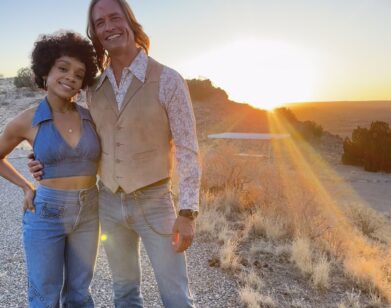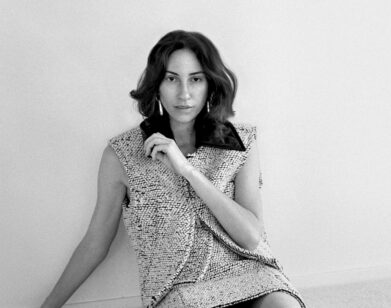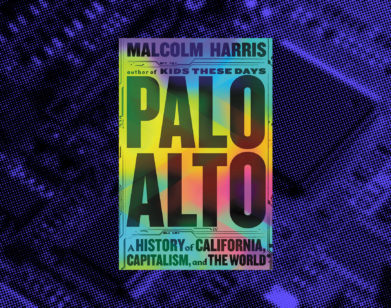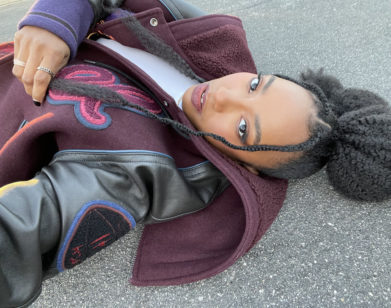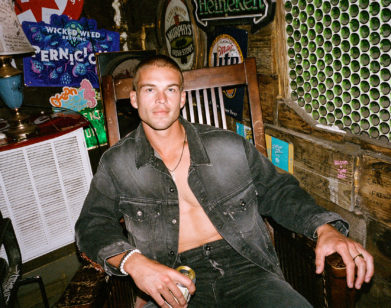IN CONVERSATION
Pauline Chalamet Tells Gia Coppola How Life Imitates Art on The Sex Lives of College Girls

She may be related to one of the film world’s biggest icons, but Pauline Chalamet’s sharp wit and eye for a good story are skills all her own. Just a year ago, the New York-born 29-year-old made her cinematic debut in the Judd Apatow-helmed dramedy The King of Staten Island. The role launched Chalamet, whose primary focus is writing and directing, into a new realm of the film world: shortly after wrapping the film, Mindy Kaling tapped her to star in her new HBO Max series The Sex Lives of College Girls. The show (out today, November 18) follows four freshman as they navigate the trials and tribulations of their new college environment—from catty coworkers, to judgmental roommates and murky romances. For Chalamet, who plays the awkward but endearing Kimberly, filming The Sex Lives of College Girls posed its own challenges and rewards. After spending her college years mired in similar coming-of-age struggles at Bard College, just a stone’s throw from Vassar College—where the show was set and shot—the filming process felt like a homecoming in more ways than one. To mark the show’s release, Chalamet sat down with the filmmaker Gia Coppola, a fellow Bard alum, to discuss their school years, their shared love of Cazzie David, and that eerie feeling when life and art merge.
———
GIA COPPOLA: Where are you right now?
PAULINE CHALAMET: I’m in Los Angeles.
COPPOLA: It’s so hot today. It’s crazy. Do you live there?
CHALAMET: No, I live in Paris. I was born and raised in New York.
COPPOLA: I love your show! Thank you for sharing it with me. It’s so binge-worthy. I just plowed right through it.
CHALAMET: Oh, cool!
COPPOLA: It was nice to re-enter the college world, and your character is so sweet and endearing. I’m excited to get to know you. I just realized that we both went to the same college.
CHALAMET: Yeah, we both went to Bard!
COPPOLA: I have such fondness for Bard. I studied photography and I really found my people there. What did you study when you were there?
CHALAMET: I double-majored in Political Studies and Theatre & Performance. I had the opposite experience. I found my people in high school, and when I got to college, I was like, “What’s going on? Why am I in the middle of nowhere?”
COPPOLA: It’s either one or the other. You either love high school or you love college. Did filming the show allow you to cleanse the palate of your bad experiences?
CHALAMET: I wouldn’t say it was a bad experience, but I spent the whole time just trying to convince myself that I was having fun. If I had studied film, maybe I would have maybe found my people. I was torn between all these different groups, so it was socially difficult. But academically, I loved Bard. Then, on the show, I got to relive my social experience.
COPPOLA: That’s what the show captures well—that weird age of being forced to make certain adult decisions while not being prepared for it.
CHALAMET: It reminds me of your movie Palo Alto, when Emma Roberts’ character is asked, “What do you want to do?” And she’s like, “I have to go to the bathroom.” How are you supposed to know what you want at that age? I think college starts too early. You should go straight into the workforce at 18 and start getting the hang of life first.
COPPOLA: That was my experience. I didn’t go directly to college after high school. I had a year to figure things out and make mistakes. Then when I did get to school, I was so excited to learn. I heard that you guys shot at Vassar during COVID. That’s quite close to Bard.
CHALAMET: Yeah, we did. It was cool to be back in that area. Although, Vassar is very different from Bard.
COPPOLA: What’s the difference?
CHALAMET: Vassar feels more New England-y. Bard feels like you’re in the middle of the forest.
COPPOLA: Since you shot during COVID and everything was very insular, it probably felt like being in school all over again. How long did you guys shoot for?
CHALAMET: A long time—from December to mid-July. We shot the majority at the Warner Brothers studio in L.A., and then we shot at Vassar during the summer.
COPPOLA: Oh, cool. I watched the first six episodes and I’m like, “Where is this gonna go?”
CHALAMET: [Laughs] Yeah. It’s funny, after all that time filming, you kind of forget what happens in each episode. I was at the premiere the other night and I was like, “Gosh, I thought that happened much later.”
COPPOLA: I know you speak fluent French, but your character is learning French in the show. You’re going back to the basics and pretending that you don’t speak the language. Was it hard to do that? You did a great job.
CHALAMET: Yeah, it was hard. There was an accent coach on set for the people who spoke French. She heard me try and put on a a bad accent and started to work with me. It was interesting to learn which words are difficult if you don’t grow up speaking the language.
COPPOLA: I can imagine that being a mindfuck. I’m trying to learn languages and I feel like it’s too late for me.
CHALAMET: It’s never too late!
COPPOLA: I’m trying to learn Italian so I have a pen pal in Italy who teaches me. Was that always part of your character? That she’s learning French?
CHALAMET: No, that happened after the pilot.
COPPOLA: What was the auditioning process like?
CHALAMET: It was during COVID—the summer of 2020—and it was a self-tape. All the callbacks were on Zoom. It was very similar to our setup right now. You would only hear a voice that was reading with you, and then you had to look into the camera so that those who were on the receiving end were at eye level. So it was an audition mixed with a test of your technical ability. [Laughs] And I proved that mine doesn’t exist. But anyway, all the auditions were on Zoom so I didn’t meet any of the girls until we got to L.A.
COPPOLA: Woah. So you only really knew each other as characters, rather than yourselves.
CHALAMET: Exactly. We were meeting each other for the first time, just like we did on the show.
COPPOLA: How do you relate to your character? What are your favorite qualities about her?
CHALAMET: I remember what it was like to arrive at college and feel out of place. Also, she’s very scholarly. I wasn’t like that in high school, but in college, something switched. But maybe that was because I was suddenly at a private institution and paying so much money to be there. I had to make the most of it. So there’s that. But Kimberly and I are also different. She has this incredibly naive quality that she wears on her sleeve. She’s wide-eyed and gets herself in a lot of very awkward situations. I like to think that we’re different in that way. [Laughs]
COPPOLA: One scene that really stuck out was when you guys are at a roommate dinner with all your parents and you’re panicking about the bill. It felt like such a real experience. I think everyone’s been in that situation, where you’re like, “I’m at this really expensive restaurant and I’m not ready for the bill.” [Laughs] It was touching. But anyway, I know that you do more than acting—you direct as well, and you sing.
CHALAMET: I do, and with my ukelele.
COPPOLA: That’s awesome. What are you working on next?
CHALAMET: I enjoy writing and directing a lot. For a long time, I was dabbling in many different things. I’ve been thinking of an analogy, and I think it works. It’s like I had all these different flowers and I was watering them all evenly, so they were growing at the same level. What I decided to do a few years ago is ask myself, “What if you honed in on one? What if I started giving one flower all the love and all the attention? It will grow faster, but that doesn’t mean that the other ones are dead.” That’s how I see my future. I have so many ideas and stories that I want to tell. But sitting down to write is a hard thing to do.
COPPOLA: Have you found a good routine to make sure you get some writing in?
CHALAMET: I write every morning. On my bookshelf in Paris, I have all of my journals. I don’t allow myself to reread them though. I think David Sedaris said, “Never reread your own work as you’re writing it.” But that’s journal writing. It’s different than a story or a script. I have eight feature film ideas in my head that all stop after two scenes. So in terms of work writing, I have no routine. I’m waiting for one to emerge.
COPPOLA: Yeah, I don’t have a method either. I’m always trying to figure out new organizational techniques and it never really works. [Laughs] I know you read a lot too, which I’m super envious of. How do you make time for that?
CHALAMET: This is gonna make it seem like my life is so organized, but it’s really not. I’m a troubled sleeper, so I always read fiction before I fall asleep.
COPPOLA: What are you reading at the moment?
CHALAMET: I’m rereading The Count of Monte Cristo. It’s my favorite book. Over the past few years, I’ve gotten all my best friends to read it. I have a book club with one of my best friends, and next on our list is Beloved by Toni Morrison. But I always start the day with nonfiction.
COPPOLA: Woah.
CHALAMET: In the morning, I usually read The New Yorker. I’m also reading Cazzie David‘s book right now. It’s really funny.
COPPOLA: She’s so smart and so funny at the same time.
CHALAMET: She’s such a good writer. It always amazes me when people are good writers. I think it’s the most impressive skill.
COPPOLA: I agree. It requires a lot of fearlessness to put yourself out there in that way.
CHALAMET: And to even know how. You might have the desire, but to be able to articulate your ideas precisely is such a talent.
COPPOLA: It’s such an art. Before we end, I want to ask this weird question. If you were a vegetable, what would you be?
CHALAMET: A raw zucchini.
COPPOLA: Why?
CHALAMET: There’s just something about them that I find fascinating.


